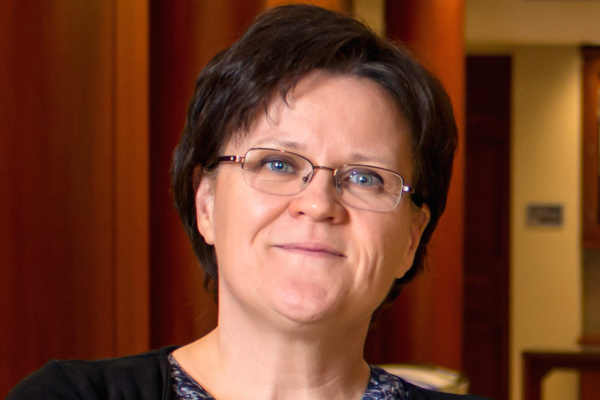Queen’s chemist garners international honour
October 23, 2018
Share

Cathleen Crudden, a professor and researcher in the Department of Chemistry, has been named the winner of the 2019 Arthur C. Cope Scholar Award in celebration of her outstanding achievements in the field of organic chemistry. This recognition of Dr. Crudden’s contributions is especially remarkable, as she is one of only a handful of Canadians to be chosen for this honour in the award’s 32-year history, and the third Queen’s faculty member to win after Andrew Evans in 2017 and Victor Snieckus in 2001.
“I am grateful for the work from my lab to be recognized by the American Chemical Society with an Arthur C. Cope Scholar Award,” says Dr. Crudden. “It is an honour to have your career recognized in this way, and I hope that it inspires my students at Queen’s and chemistry students across Canada to know that they can make an international impact in this exciting discipline.”
Dr. Crudden is widely known for innovations in the development of organic chemistry approaches to the preparation of molecules of interest to the pharmaceutical industry. Specifically, her work on the preparation of “chiral” organic compounds using Suzuki-Miyaura cross–coupling chemistry has been lauded as inspirational and revolutionary by researchers in the field.
In 2014, work from her research group in the field of carbon-based monolayers on metal surfaces garnered international recognition from diverse fields including chemistry, physics, biology, materials engineering and chemical engineering. The outcomes of this work have applications in the medical, automotive, and electronics industries. Experts described this work as “game changing,” “elegant” and “the new gold standard.”
“Dr. Crudden has been ahead of her time in two distinct areas – stereospecific sp3–sp2 cross-couplings and the use of N-heterocyclic carbenes for surface modification. She has just the right combination of deep understanding of chemical reactivity and appreciation for challenging problems in broader areas of science,” says Jeff Bode, a professor of organic chemistry and head of the Bode Research Group at ETH Zürich in Switzerland. “Nowadays, many groups work on sp3–sp2 cross-couplings, and it was early work from Cathy that really convinced the field that this could be a viable approach to the construction of challenging carbon–carbon bonds.”
Dr. Crudden has published over 100 papers, many of which have appeared in the highest impact journals in the field, and has won many awards for her innovation and the practical contributions to her field. She is a Tier 1 Canada Research Chair, holds the R.U. Lemieux Award from the Chemical Institute of Canada, and the Carol Tyler Award from the International Precious Metals Institute. Previously, she has been a Killam Research Fellow, has won the Clara Benson Award, and an NSERC Accelerator Award, among many others. She has also performed leadership roles within Queen’s and nationally, as Principal Investigator of CFI Innovation Fund grants and NSERC CREATE grants, and served as President of the Canadian Society for Chemistry and Chair of the Manufacturing and Strategic Grant panel at NSERC. She is currently the Chair of the NSERC-Chemistry Liaison Committee, which brings a voice of the national chemistry community to the attention of the federal STEM granting agency.
“Dr. Crudden’s research has pushed the boundaries of organic chemistry, garnering the attention of academics and industry professionals across the globe,” says Kimberly Woodhouse, Queen's Vice-Principal (Research). “My sincere congratulations to her on winning this prestigious honour.”
Learn more about the Arthur C. Cope Scholar Awards.